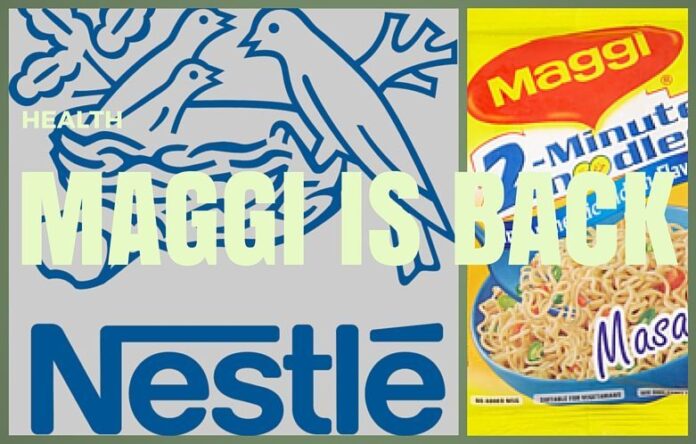
PerformanceGurus Staff
Mumbai/New Delhi, Oct 16
[dropcap color=”#008040″ boxed=”yes” boxed_radius=”8px” class=”” id=””]N[/dropcap]estle India said on Friday that 100% of the Maggi instant noodles’ samples tested in three laboratories have been cleared and that the noodles are safe for human consumption. Armed with these reports, the Indian arm of the Swiss food giant Nestle (MNC) plans to resume soon the production of Maggi noodles that were banned last June amid concerns over high lead and monosodium glutamate (MSG) content.
In a statement, Nestle said the results have been received from all three labs mandated by the Bombay High Court to test samples of noodles manufactured by the company.
“All 90 samples, covering six different versions, tested by the three laboratories, are clear, with lead much below the allowed limits,” the Nestle statement added. The company promised that it would continue to collaborate with the Indian food regulator, Food Safety and Standards Authority of India (FSSAI), and other stakeholders on the issue. “In compliance with the Bombay High Court orders, we will now commence manufacture and will begin selling only after the newly manufactured products are also cleared by the three designated laboratories. We are committed to reintroduce our Maggi noodles (in the Indian market) at the earliest,” Nestle said.
[dropcap color=”#008040″ boxed=”yes” boxed_radius=”8px” class=”” id=””]I[/dropcap]n the past few months, Nestle conducted around 3,500 tests representing 200 million packs in national and international accredited laboratories and all reports were clear. Besides, tests in several other countries like the US, Britain, Australia and Singapore also found Maggi noodles manufactured in India safe for human consumption. In June, the FSSAI ordered a nationwide ban on the company’s noodles on the ground that these were “unsafe and hazardous” for human consumption due to presence of lead allegedly beyond permissible limits.
The MNC withdrew its instant noodles from the Indian market as a result and moved the Bombay High Court against the FSSAI ban.
A division bench comprising Justices V.M. Kanade and B.P. Colabawalla in August set aside the June 5 order of the FSSAI and also quashed an order of Maharashtra’s Food and Drugs Administration banning production and sale of Maggi noodles in India and the state. The court, however, ordered fresh tests on Maggi noodles’ samples at three independent labs across India.
Nestle India was directed to send five samples of each variant to accredited labs in Punjab, Hyderabad and Jaipur and asked the labs to give reports within six weeks.
[dropcap color=”#008040″ boxed=”yes” boxed_radius=”8px” class=”” id=””]T[/dropcap]he consumer affairs ministry filed a class action suit against Nestle India, seeking about Rs.640 crores ($98.55 million) in damages for alleged unfair trade practices, false labelling and misleading advertisements. It was for the first time that the ministry dragged a company to the National Consumer Disputes Redressal Commission (NCDRC) under the Consumer Protection Act.
However, the apex consumer court on Thursday ordered fresh tests on 13 samples of Maggi noodles from nine batches to determine lead and “MSG stock glutamate” content.
Nestle India on September 30 said that due to the ban, over 9,000 suppliers of Maggi noodles had gone out of business. Over 10,000-12,000 distributors also lost their livelihood. The company said it wished to resolve the matter as soon as possible and was “not interested in delaying it”.
Suresh Narayanan, the India chief of the company, earlier said the “focus of the company is to get Nestle back on the shelves” and added that the “controversy had cast a shadow over Nestle’s portfolio”. Narayanan told the media that the multinational company was targeting to get the product into the Indian market by the year-end.
Meanwhile, the shares of Nestle India rose by 5.6% to Rs.6,555 ($101), the biggest gain since August 5. The shares had plunged after FSSAI’s recall order which resulted in the company’s first ever quarterly loss in more than 15 years.
Late Breaking news from New Delhi, Oct 16 23:30hrs
Nestle India on Friday said all samples of its Maggi noodles have passed the required tests as directed by the Bombay High Court but it would hit the market after some time as the newly-manufactured product has to go through fresh tests.
“The manufactured products will undergo fresh tests at the three National Accreditation Board For Testing and Calibration Laboratories (NABL) labs in Mohali, Jaipur and Hyderabad. Once the tests confirm lead within permissible limits, we shall proceed with the sale of the noodles,” a company spokesperson told IANS.
“Coming back to the market is complex and requires alignment with several stakeholders, including our suppliers, distributors and retailers, among others,” the spokesperson added.
On June 5, the Food Safety and Standards Authority of India (FSSAI) ordered a nationwide ban on the company’s noodles on the ground that these were “unsafe and hazardous” for human consumption due to presence of lead allegedly beyond permissible limits
Note:
1. The conversion rate used in this article is 1 US Dollar = 64.95 Rupees.
2. Some of the content is used from IANS.
3. Text in Bold points to additional data on the topic.
- NIA confiscates Pak-harboured Khalistani terrorist Lakhbir Singh Rode’s key aide’s land in Moga - April 19, 2024
- Prime Minister Narendra Modi: A Gujju businessman who does not invest his precious time for a losing battle - April 13, 2024
- NIA arrests two accused Shazib and Taahaa in Bengaluru’s Rameshwaram Cafe blast case from Kolkata - April 12, 2024











The problem with junk food like Maggi is they are perilously salt-laden, no matter what the company or “scientists” claim to the contrary or blind the public with science!
One serving of this curly convenient delicacy meets all the salt needs per day of a person. So eating foods with salt even like the innocuous dal, rasam, chutneys etc., after consuming Maggi will amount to excessive salt intake for a day – which is no small a health cause for concern given what it can do to the body.
If one can muster the self-discipline to strictly avoid salt for the day in any form post-Maggi-indulgence, then there is little harm.
In any case, such foodstuffs are always best avoided given what they do to our stomachs and minds with all their masalas and other processed ingredients. Countries like Japan and China heavily consume noodles because they cannot otherwise grow food grains owing to the lack of agricultural lands or unfavorable climatic conditions. But here in India we are blessed with a wide variety of farm produce like rice, dals, millets, vegetables, fruit etc from which numerous healthy and delicious eatables can be easily prepared, obviating the need for consuming abominable stale, chemicals-cum-preservatives-riddled cacotrophic snacks!
Lastly let’s remember the adage – “Jaisa khaye ann, vaisa hoye man; jaisa piye paani, vaisi hoye vani” !! We are what we eat. Man is made by the kind of food he eats. Junk food can only create a junk civilization devoid of culture, values and higher intellect!
Whatever be the merits of the case one thing is certain- there has definitely been a decline in the taste of Maggi. The ones we used to get when I was a kid were far better and made for a yummy breakfast or evening snack. Their masalas don’t pack a punch anymore.